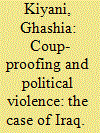| Srl | Item |
| 1 |
ID:
197224


|
|
|
|
|
| Summary/Abstract |
Civil-military relations and terrorism are both extensively studied subjects. Their relationship has, however, yet to be examined. We maintain that public conflict between the civilian and the military leadership in a country and declining civil control over the armed forces may often precipitate a rise in domestic terror events. Civil-military conflict and reduced civilian control can lead to agency slack by the armed forces and ineffective counterterror policies. These phenomena are also associated with policies that exclude groups in society and generate grievances, leading some to turn to terror. In zero inflated negative binomial analyses of domestic terror events and two distinct indicators of civil-military tension, we find support for our contention. Terror incidents increase both when civil-military conflict rises and when civilian control decreases. Our results add to understanding of both the domestic consequences of civil-military tension and the types of influences that impact domestic terror.
|
|
|
|
|
|
|
|
|
|
|
|
|
|
|
|
| 2 |
ID:
183751


|
|
|
|
|
| Summary/Abstract |
This article examines the impact of coup-proofing on political violence while a leader is in power and during regime transition. This study focuses on the case of Iraq during Saddam Hussein’s rule between 1979-2003 and including the aftermath of the 2003 US invasion, which led to Saddam’s removal from power. The article argues that Saddam Hussein’s coup-proofing strategies allowed him to implement political violence and human rights abuses against the wider population. Moreover, Saddam’s coup-proofing strategies exacerbated violence beyond his rule by driving his former regime loyalists into violent insurgencies as well as indirectly by setting up a society with large amounts of distrust between loyalists and others.
|
|
|
|
|
|
|
|
|
|
|
|
|
|
|
|
| 3 |
ID:
197359


|
|
|
|
|
| Summary/Abstract |
How do economic sanctions affect civil–military relations in targeted states? Though much research has focused on how external military threats affect civil–military relations, no study to date has offered a thorough assessment of the degree to which non-military threats, particularly sanctions, alter civil–military dynamics. We posit that sanctions alter civil–military bargaining in ways that increase the military’s role in political decision-making, ultimately lessening civilian control. However, we also posit that targeted regime leaders want to fulfill as many of the military’s demands as possible with their restricted pot of resources, ultimately leading to sanctions’ limited role in observed coup attempts. We substantiate our theoretical claims using time-series, cross-national data on economic sanctions, civilian control, and coup attempts.
|
|
|
|
|
|
|
|
|
|
|
|
|
|
|
|